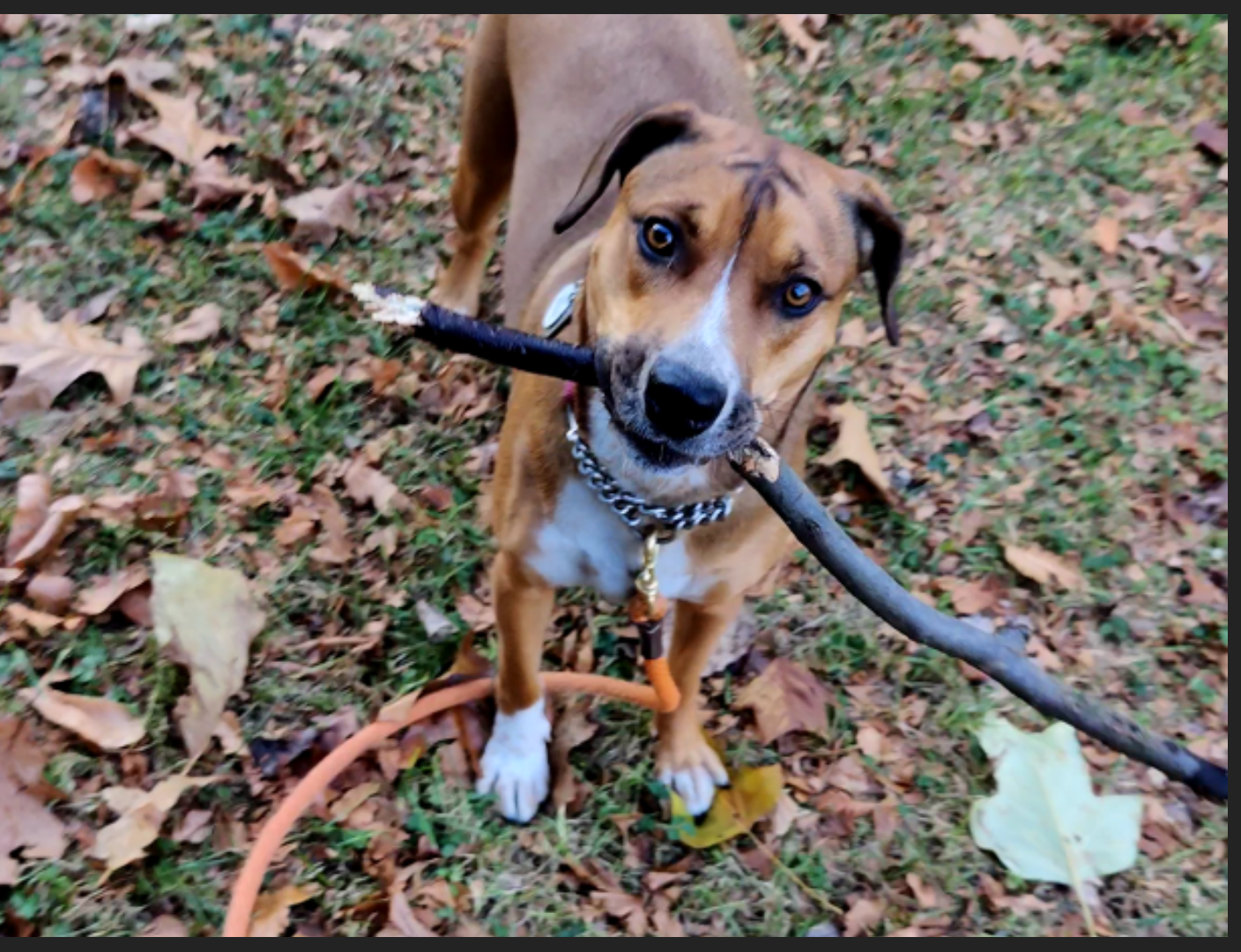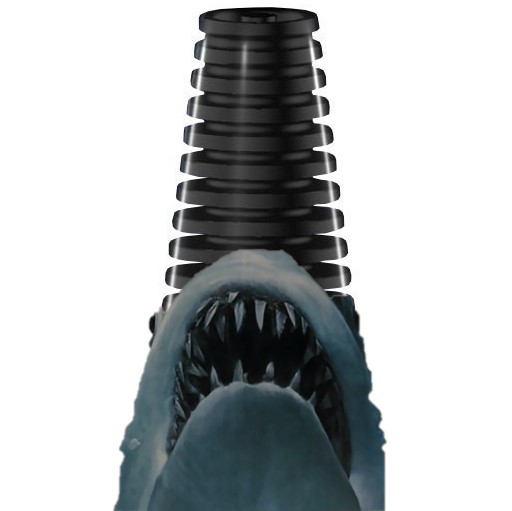She’s clearly having fun, running around in circles, chewing sticks, and finding and eating cat poop. And I don’t want to discourage her from having fun when I take her outside (except for the cat poop thing – that needs to stop).
But she seems to have the idea that jumping up and biting my wrists or my ankles is a fun game that we both enjoy, and she seems to be getting more agressive about it.

I’ve always trained dogs not to bite by firmly saying “Ow! No bite.” They have to learn that we are more delicate than other dogs. It’s also very important to provide them with an alternative.
So I make a noise like it hurt, say no bite, and then give them a toy immediately after. This promotes what I call ‘substitute biting,’ where I’ll rile one of my dogs up with a little rough housing, and they’ll grab a toy and start chomping down and shaking that while looking at me.
I fostered a stray who I basically had to train all the puppy phases out of when he was about 1 year old and as big as my wife (GSD mix/mut). Even tho he was starved of human contact, he too learned not to bite with this method. Took longer than most puppies… but when I’d say “Ow! No bite.” he’d stop and look at me trying to figure out what prompted it. If toy substitution didn’t work, I’d stop playing. He learned that if he wanted to play, he couldn’t bite the fragile humans.
Also worth noting that some dogs (common with GSD for instance) like to engage in a sort of handholding, especially as a puppy. It may seem like they’re wanting to chew on you if you don’t know better, but if they kinda just get your hand in their mouth it could be the ‘handholding.’ I break that habit because it can still scratch and I don’t want someone to claim a dog of mine ‘bit’ them by doing it.
Had to google what GSD meant because all I could hear was great southern Dane, waauw wuuuw
German shepherd (dog)?
Yes, German Shepherd Dog.
Yep. I honestly used to think the abbreviation is kinda cringeworthy, but it’s outweighed by my laziness…
Stop playing as soon as it happens. Wait 10-15 mins before going again.
To add onto this use reinforcing language. Soon they’ll start to react to the word so you will continue playing.
You have to set boundaries. She’s going to keep on doing it until you teach her not to, and she’s more likely to do so to other people as well.
Give a sharp “Ow!” and do it in a high pitched voice. Then give her a sharp “No!” Then the play stops. You’re giving three types of reinforcement there - the yelp is for letting her know she hurt you (do this even if it didn’t hurt), saying “no” helps her to understand what she was doing was not the correct behavior, and withdrawing the fun is the punishment part.
It sounds like you also might need general obedience training. If she’s good around other dogs I’d consider obedience classes where you can work with her under the guidance of a trainer.
You can try training her on your own, too, but get a good up to date book on training. Use treats for positive reinforcement. At a minimum, for her safety and for yours, she should learn the commands for sit, stay, and come. I’d also do “give” meaning she has to let you take the stick (or whatever) out of her mouth, and I also like to train away food guarding behavior (you should be able to pick up their food bowl while they’re eating and not have them bite or growl.
The cat poop one is not a fight you’re going to win, but the rest of it should be solvable. At the very least, if you catch her going for it, a sharp “No” and calling her back to you to get a treat should work, but she is going to keep doing it if she can get away with it. I’d start with the basics and then work on the poop eating.
This is the method I used, but if mine was wayyy too amped and persisted with aggressive play, I would redirect with a toy. I’d just put it in his mouth when he got mouthy so he would learn what he could bite with force. Later, once he learned to not be rough during play, I trained a command word to use when he got carried away.
Also for food, from the first month I had him, I trained him to sit and wait for me to touch his feet, ears, and mouth before he could eat. And also I’d take his food randomly. If he responded with aggression, he didn’t get to eat until he let me take it away without issue. However, he was a 6month old puppy at the time, so we were working on brand new skills and not breaking old habits. I have zero advice or experience for older dogs. Not sure if it’s different.
Probably 80% of it is his natural demeanor, but 5 years later and virtually nothing bothers this dog
I used this method. My dog used to get so rough that I was concerned that he was going to hurt someone.
Adding to it, when play stopped, I turned away and ‘sulked’ because body language means so much. Also, I added in a toy for tug of war, and whenever the play escaped the toy I said ow and play was done.
This took a few months to really sink in for the dog, but we got to the point where he would play, we would say to get a toy, and there was no more leaping for limbs.
Some long time later, we were to the point where I could hold his teeth for gentle tug of war, but he decided he didn’t like my skin in his mouth.
With our puppies we say “OW” very dramatically, hold the limb that was nipped like it is wounded, and stop play for 5-10 minutes and return. Works like a charm
Yelp, even if it doesn’t hurt. They understand that more than words
My understanding is that they learn how to play as puppies as they would get feedback. So you may consider exaggerating when it hurts to better highlight the pain. Alternatively, another puppy to play with.
That was what I was going to say as well.
They usually learn to stop by interacting with their litter mates.
Most pups are taken away too young for this to happen. You want pups with their littermates at least up to 12 weeks and they start with pretty good bite inhibition. It’s so different meeting pups treated properly rather than the byb pups taken at 8 weeks or sometimes even younger.
Yep, the difference in that short time is pretty big. My parents bred dogs when I was a kid. My dad liked to keep them together for 16 weeks.
taken at 8 weeks or sometimes even younger.
The people who do this are arseholes running puppy mills in my opinion.
16 is even better. It’s difficult because you really want them to start socialisation by that point and breeders individually socialising a litter can be a challenge, but for those who can it’s a much more stable dog the owner is starting with.
I do dog rescue and a lot of people got their first ever dog over covid and people who had no idea how to raise a pup raised some really messed up dogs. Starting with an older dog that is a bit more stable just makes all the difference.
You say “ow” and stop playing for a bit. They’ll figure it out eventually. Most breeds, anyway. Huskies will just learn to be super gentle while still using their mouth.
Always reinforce with the words “No bite!”
Dogs speak and understand english very poorly
They learn tone and phrase just fine
My mother-in-law’s dog had a vocabulary of over 80 words.
Yelp, make it understood that you’re not having fun. Sounds like a distressed puppy for a any time it happens. Oddly, that worked with my dog for her jumping on me, but not for everyone. It’s… Frustrating. She knows that’s not how I play, but others in my family not so much.
Edit: I’m not a trainer, you might want to get a session or two with someone who is highly rated, to get their input.
Have plenty of toys around so when she starts to get bitey you can redirect it towards a toy which will help because she’ll learn “oh cool I can chew/bite this”. Also work on teaching her the word No or off/down. Really should be high on the priority list of commands to teach. You can also try wincing in pain like a dog would and that will sometimes indicate that they’re playing too rough and will stop, but that doesn’t always work. In fact with my dog it hardly worked when he was a puppy.
I used to just scream NO! and give them a “gentle” push so they would lose their balance. Never hurt them but make them understand. It’s easier with puppies but a grown dog will try to test you more and in the worst case scenario might even retalliate… If that happens you will need to “fight” them. Get them on their back and hold them there until they calm down. Without actually hurting them ofcourse. You just need to overpower them, show them who’s boss.
THIS ONLY WORKS IF YOU ENCOURAGE GOOD BEHAVIOUR ALSO.
It’s not about punishing, ideally you need about 90% positive reinforcement and 10% negative. (i made up the numbers but you get what i’m saying) You need the positive reinforcement so they will respect you when you get angry. If you do it right the only thing you’ll need to do eventually is scream NO!! and they’ll respect you and try to figure out why they made you angry and try learn from it on their own because they will make it their goal to please you.
I hope this made sense.
This is old fashioned dominance training, it’s been proven not to work well and it damages the dog and your relationship with them.
For cat poop, we got one of these dog playpen enclosures: Amazon Basics - Octagonal Foldable Metal Exercise Pet Play Pen for Dogs, Fence Pen, Single Door, Small, 60 x 60 x 30 Inches, Black https://a.co/d/6Nz4VuU
It is set so that the cats can get through a gap easily, but Henry can’t get his head through without causing a huge racket.
That doesn’t look like a very big area for a dog
I thought the OP was talking about their dog getting into an indoors litter box. It’s not for the dog to play in, it’s to keep them out. (In case you’re joking, let me be the first to say whoooosh to myself lol)
Oh phew, I assumed dog was finding cat poo when out and about so I thought you were suggesting setting that up as a prison yard for dog to attempt to run around in!
Remove its teeth.
By that logic, remove your thumbs?
Sure! That’s an option too!
Joke’s on you, I pull the trigger with my index.
So you’re a dog murderer then?
Woof.







